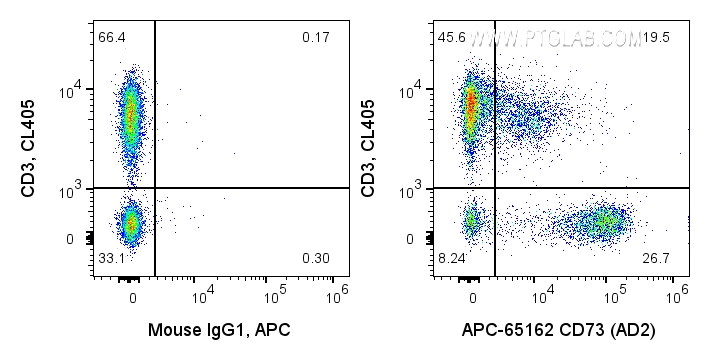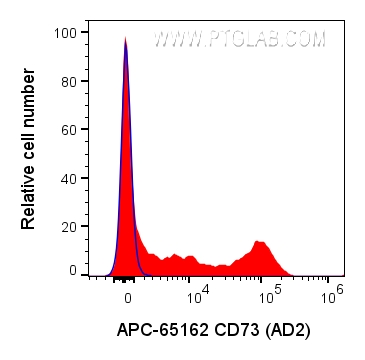验证数据展示
经过测试的应用
| Positive FC detected in | human PBMCs |
推荐稀释比
| 应用 | 推荐稀释比 |
|---|---|
| This reagent has been pre-titrated and tested for flow cytometric analysis. The suggested use of this reagent is 5 μl per 10^6 cells in a 100 µl suspension or 5 μl per 100 µl of whole blood. | |
| Sample-dependent, Check data in validation data gallery. | |
产品信息
APC-65162 targets CD73 in FC applications and shows reactivity with Human samples.
| 经测试应用 | FC Application Description |
| 经测试反应性 | Human |
| 免疫原 | Pre-B leukemia cell line 种属同源性预测 |
| 宿主/亚型 | Mouse / IgG1, kappa |
| 抗体类别 | Monoclonal |
| 产品类型 | Antibody |
| 全称 | 5'-nucleotidase, ecto (CD73) |
| 别名 | 5 NT, 5 nucleotidase, 5' nucleotidase, ecto (CD73), CD73, E5NT, Ecto 5 nucleotidase, eN, eNT, NT, NT5, NT5E, NTE |
| 计算分子量 | 29 kDa, 63 kDa |
| GenBank蛋白编号 | BC015940 |
| 基因名称 | CD73 |
| Gene ID (NCBI) | 4907 |
| RRID | AB_2883035 |
| 偶联类型 | APC Fluorescent Dye |
| 最大激发/发射波长 | 650 nm / 660 nm |
| 形式 | Liquid |
| 纯化方式 | Affinity purification |
| UNIPROT ID | P21589 |
| 储存缓冲液 | PBS with 0.09% sodium azide and 0.5% BSA , pH 7.3 |
| 储存条件 | Store at 2-8°C. Avoid exposure to light. Stable for one year after shipment. |
背景介绍
CD73, also known as ecto-5'-nucleotidase (5'-NT), is a 70-kDa, glycosyl-phosphatidylinositol-linked membrane-bound glycoprotein found in most tissues (PMID: 18404475; 20179192). CD73 is an ectoenzyme that catalyzes the dephosphorylation of AMP and other nucleoside monophosphates (PMID: 9553767). In the human immune system, CD73 is expressed on subsets of T and B cells, on germinal center follicular dendritic cells, and on thymic medullary reticular fibroblasts and epithelial cells (PMID: 2137649; 9553767). CD73 is highly expressed in many human solid tumors and is closely involved in cancer progression (PMID: 20179192).
实验方案
| Product Specific Protocols | |
|---|---|
| FC protocol for APC CD73 antibody APC-65162 | Download protocol |
| Standard Protocols | |
|---|---|
| Click here to view our Standard Protocols |

